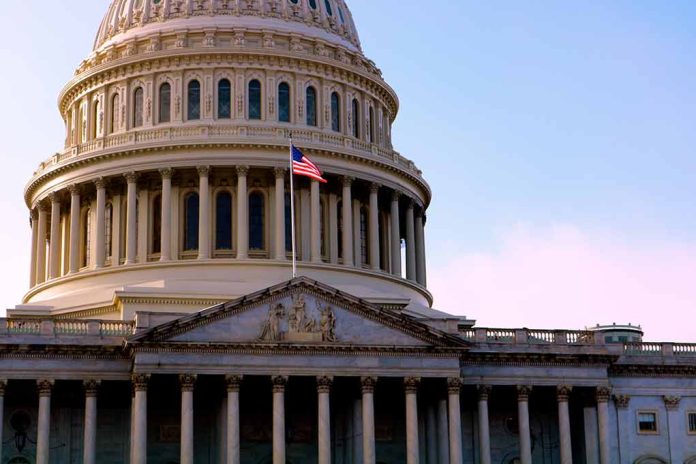
The Trump administration is exploring a controversial idea: deporting American citizens to foreign prisons.
Key Takeaways
- President Trump considers deporting “homegrown criminals” to foreign prisons, raising constitutional concerns.
- The Supreme Court previously ruled against deporting U.S. citizens without due process.
- The Trump administration praised El Salvador’s prison system in discussions with President Nayib Bukele.
- Scholars argue this could violate constitutional amendments and spark legal challenges.
- An analysis shows 75% of deportees lacked criminal records, highlighting due process concerns.
Legal and Civil Liberties Concerns
The Trump administration’s contemplation of deporting American citizens to foreign prisons has sparked debate over legal and civil liberties. References to sending “homegrown criminals” to countries like El Salvador may conflict with constitutional protections. Concerns include potential violations of the 8th Amendment, governing cruel and unusual punishment. The administration’s discussions with El Salvadoran President Nayib Bukele about using facilities such as the Terrorism Confinement Center (CECOT) further complicate the legal landscape, with Buckele commended for El Salvador’s prison efforts.
President Trump highlighted violent acts like subway shoving and baseball bat attacks attributed to these individuals as justification for his proposal. However, despite the assertion that these individuals are linked to violent crimes, a study revealed that a significant majority of those deported lack a criminal record and are linked mostly to minor offenses. Legal experts warn this move raises questions of compliance with the U.S. Constitution, which mandates due process before penalizing citizens.
Constitutional Challenges
The idea faces constitutional scrutiny, particularly regarding the 8th Amendment’s protection against cruel and unusual punishment. A past Supreme Court ruling mandates due process for alleged gang members, yet deportations continue under the Alien Enemies Act. Cases like Kilmar Abrego Garcia’s illustrate administrative errors in deportation processes, leading the Supreme Court to order the Justice Department to facilitate returns. However, President Bukele claimed an inability to return Garcia, further highlighting the complex international dynamics at play.
As legal scholars predict potential constitutional challenges, civil liberties advocates express alarm over this policy shift. While President Trump’s intentions may be to focus on crime reduction, the implications pose profound concerns for rights guaranteed under U.S. law. The deportation proposal remains under consideration, underscoring the importance of safeguarding American citizens’ constitutional protections within these contentious discussions.
Global and Domestic Repercussions
If implemented, international ramifications would follow as bilateral relations with countries receiving deportees come under strain. Trust in American adherence to international legal standards may waver. The Trump administration’s focus on strengthening law enforcement measures collides with the necessity to uphold constitutional rights. As proceedings evolve, the world observes how America navigates the delicate balance between national security and the inviolable liberties of its citizens.
Legal deliberations within both national and international courts loom as potential next steps. The unfolding narrative reflects a pivotal moment of tension between public safety imperatives and individual freedoms. As policy debates continue, scrutiny remains toward ensuring constitutional fidelity within any administration signals.
Sources:
- https://www.reuters.com/world/americas/trump-wants-deport-some-us-citizens-el-salvador-2025-04-14/
- https://www.cbsnews.com/news/trump-homegrown-criminals-foreign-prisons-cecot/
- https://www.newsmax.com/newsfront/trump-prisons-deportation/2025/04/15/id/1207018










